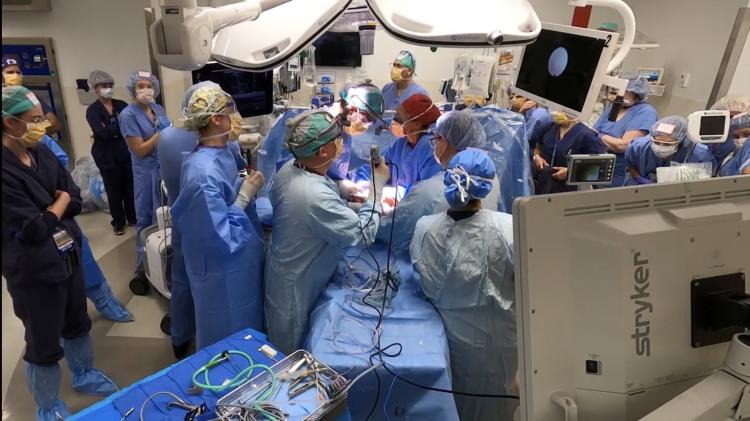
Overview
These areas of strength provide UW MFM fellows with unique learning opportunities that enhance their ability to practice evidence-based medicine, conduct meaningful research and interpret clinical studies. Our MFM fellowship program follows the ABOG MFM blueprint for Maternal Fetal Medicine, ensuring that all graduates cover the learning objectives required for board certification.
36 month fellowship schedule
- 15 months of clinical rotations – this includes 8 weeks of dedicated inpatient time on Labor and Delivery spread throughout the 3 years, with the remaining time spent in outpatient clinics covering the full breadth of maternal fetal subspeciality clinics as well as dedicated ultrasound time
- 1 month in the Medical Intensive Care Unit
- 2 months completing a comprehensive Genetics and Genomics course
- 12 months of research
- 6 months of elective
SITES OF PRACTICE
Clinical experience in the UW Maternal Fetal Medicine fellowship program occurs at 3 clinical sites. The University of Washington Montlake campus is the home of the fellowship, the site of inpatient Labor and Delivery rotations, the location of fellow continuity clinics as well as the majority of subspeciality clinics and the fellows’ office.
Fellows also spend time at the Seattle Children’s Hospital (SCH) Prenatal Diagnosis office as part of our joint UW/SCH Prenatal Diagnosis Program. The bulk of fetal echocardiography learning occurs in this location, as well as opportunities to interact with and learn from multiple pediatric subspecialists during antenatal counseling for complex fetal anomalies.
Our 3rd site is located 30 minutes south of the main University of Washington Seattle campus at Valley Medical Center in Renton, WA. Our Valley Medical Center office is a busy consultation only clinic, with a high-volume of hands-on ultrasound experience.
Our program strives to create a cohesive and progressively advancing curriculum over the 36 months of fellowship. While all areas of maternal fetal medicine are covered in every year, each fellowship year emphasizes particular areas of maternal-fetal care to build a foundation that grows in depth and breadth over the 36 months.
By year
First year
The first year of fellowship builds a foundation for medically and obstetrically complex pregnancies as well as prenatal ultrasound skills. Fellows rotate through prematurity prevention, diabetes, and hypertension clinics, managing complicated patients under the supervision of faculty. This first year fellow has one half day per week in clinic for high-risk continuity patients. An attending perinatologist manages the content of the clinic and serves as a mentor. Dedicated ultrasound experience is incorporated into all clinical rotations, and there is a 1-month intensive ultrasound-only rotation annually.
Second year
The second year of fellowship expands on the topics learned in first year, adding patients with increasing complexity. Our second-year fellows have further exposure to fetal anomalies, prenatal diagnosis and genetics, while continuing to grow prenatal ultrasound skills and incorporate experience with fetal echocardiography. The second year includes a 1-month intensive care unit (ICU) rotation, where fellows rotate on the critical care service. Fellows continue one half day clinic per week seeing high-risk continuity patients as well as the 1-month dedicated ultrasound-only rotation.
Third year
In the third year of fellowship, senior fellows have increased flexibility with 6 months of elective time to hone their individual interests and skills. There is tremendous flexibility in the elective time, ranging from specialized clinical experiences, additional in-depth research, additional exposure to fetal echocardiography, approved away rotations or additional training in Medical Genetics. Third-year outpatient clinical rotations are a return tour through diabetes, prematurity prevention, and ultrasound/prenatal diagnosis subspecialty clinics to prepare for graduation to independent practice. Fellows continue one half day per week in clinic seeing high-risk continuity patients as well as the 1-month dedicated ultrasound-only rotation.
Labor & Delivery
Fellows spend a total of 8 weeks on the inpatient Labor and Delivery service functioning in the role of the supervising physician for the resident team, caring for laboring and acute antepartum patients under the supervision of a Maternal Fetal Medicine attending. Our program values the educational experience of caring for obstetrically complicated hospitalized patients, including patients requiring admission to the intensive care unit during pregnancy and postpartum. We aim to graduate skilled MFM clinicians prepared for independent care of critically ill parturients who can collaborate effectively with OB Anesthesia, Neonatology and Critical Care, including excellent clinical judgment and verbal communication skills with other team members, referring physicians and patients.
Our fellows take inpatient call on Labor and Delivery, with graduated independence as they orient to our program and L&D unit. All fellow call shifts are in-house. There is no home call or GYN call. Total fellow call shifts average two 12-hour shifts per month.
ADDITIONAL TRAINING OPPORTUNITIES
Fellows have the opportunity to obtain a Master of Science (MS) or Master of Public Health Degree (MPH). While we do not have a formal combined MFM-Genetics fellowship program, there is the potential for fellows to add on an additional year of training through our Medical Genetics division at the University of Washington. By using the 3rd year elective 6 months towards completion of medical genetics training, we can work with interested fellows to become board-eligible in both Maternal Fetal Medicine as well as Medical Genetics through an individual ABOG/ABMGG approved 4-year program. There is additional flexibility to apply for ABOG approval for away rotations during 3rd-year elective time (Example: previous fellow involvement in the SMFM Queen Global Health Fellowship, which resulted in 6 months of away rotations in Geneva, Switzerland at the World Health Organization).
PROCEDURAL VOLUME
Fellows actively participate in all MFM procedures. Our annual MFM Procedural Volume for UW Medicine (AY 2023):
- Amniocentesis = 215
- Chorionic Villus Sampling = 30
- Cesarean Hysterectomy = 17
- Cerclage = 106
EDUCATIONAL OBJECTIVES
The UW MFM Fellowship adheres to the learning objectives outlined in the ABOG Maternal-Fetal Medicine Guide to Learning. The fellowship program emphasizes the following specific learning objectives.
Medical Complications of Pregnancy
- Medical Disorders
- Critical Care
Obstetric Complications
- Preterm Labor and Preterm Premature Rupture of Membranes (PPROM)
- Hypertensive Disorders
- Multiple Gestation
- Fetal Demise
- Procedures Relating to Obstetrical Complications
- Obstetric Anesthesia
- Management of Obstetrical Complications
Fetal Complications and Prenatal Diagnosis
- Ultrasound
- Evaluation, Management, and Diagnosis of Fetal Complications
Genetics and Genomics
Core Competencies
Ethics and Professionalism
Patient Safety Interpersonal and Communication Skills
Systems-based Practice
Practice-based Learning and Improvement
Evidence-based Medicine



